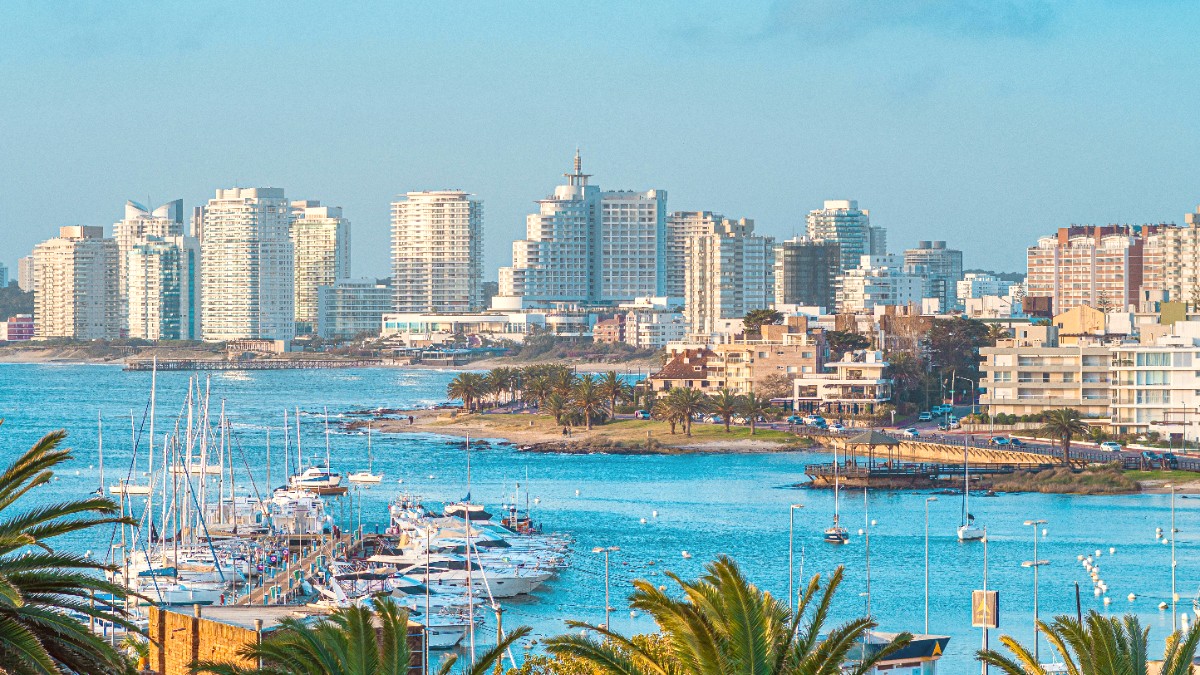
Eastern Uruguay, Uruguay
Punta del Este experiences four distinct seasons, characteristic of a temperate climate. Summer (December - February) presents the warmest and most active period, with average daily temperatures from 20°C to 27°C (68°F to 81°F). High humidity is common.
Winter (June - August) presents the coolest and driest period, with temperatures from 8°C to 15°C (46°F to 59°F). Lower humidity and clear, crisp days are common. Autumn and Spring are transitional, with pleasant temperatures and moderate precipitation.
Punta del Este is not in a monsoon or hurricane zone. Occasional strong winds occur, specifically during spring and autumn. These winds impact beach conditions, creating larger waves on Playa Brava.
Heavy rainfall also occurs, though typically not prolonged. Coastal storms are rare but bring rough seas and high tides. Always check local weather forecasts upon arrival to prepare for daily conditions.
Late December - February
Warmest weather, peak beach conditions, numerous events, buzzing energy.
Highest prices, significant crowds, busy beaches, traffic congestion, longer waits.
November, March
Pleasant temperatures, fewer crowds, relaxed atmosphere, better value prices.
Some establishments operate reduced hours or close towards end of March.
April - October
Lowest prices, peaceful atmosphere, ideal for local immersion, prime whale watching.
Many establishments close, minimal beach activity, very limited nightlife.
For a lively experience with full beach activity and city celebrations, December to February presents the peak period. For a more tranquil atmosphere suitable for exploration and photography, the shoulder seasons of November or March are excellent.
The low season offers unique advantages, specifically for those interested in whale watching or seeking solitude. It's a good time for quiet coastal walks and experiencing the local pace of life without tourist crowds.
Late December to February.
November or March (shoulder season).
July to October (winter months).
May to October (consistent waves on Playa Brava).
April to October (low season).
Entry requirements vary based on your nationality.
Citizens of many countries enter Uruguay for tourist stays up to 90 days without a visa.
If your country is not on the visa-free list, a tourist visa application before travel is necessary.
Punta del Este caters to various budgets, from frugal backpacking to luxurious indulgence.
Prioritizing your health and safety in Punta del Este means being prepared for common situations and knowing where to find assistance. Uruguay is generally a safe country for tourists.
Uruguay does not impose mandatory vaccination for general tourism.
Up-to-date MMR, DTP, and Varicella are generally a good idea.
Hepatitis A and Typhoid are often recommended for international travelers.
Sunburn and Dehydration
The sun in Punta del Este reaches an intense level, especially during summer. Staying hydrated is important.
Use High-SPF sunscreen (30+), reapply frequently, wear a Wide-brimmed hat, and Sunglasses. Drink Plenty of bottled water. Carry a Reusable water bottle.
Insect Bites: Mosquitoes are present in warmer months. Use Insect repellent containing DEET or picaridin.
Punta del Este has public and private hospitals and clinics. Private options often present higher standards of care.
Widely available for over-the-counter medications and advice. Look for a green cross sign.
Dial 911 for Police, Fire Department, and Ambulance services. This is the unified emergency number.
Uruguay is a low risk for major natural disasters. However, certain seasonal hazards merit awareness.
Punta del Este is a generally safe destination for tourists, notably when compared to larger South American metropolitan areas. Most visitors experience a safe and pleasant trip.
The main concern involves petty crime, like pickpocketing and bag snatching, especially in crowded tourist areas like popular beaches (Playa Brava, the Port), bus terminals, or bustling commercial streets (Gorlero) during peak season.
The Peninsula, La Barra, and residential areas along Mansa and Brava beaches are well-patrolled and generally safe. They are well-lit at night. Stay aware of your surroundings, especially in less populated areas or late at night.
Purchasing comprehensive travel insurance is a good idea for any trip abroad. A policy from World Nomads, SafetyWing, or Insubuy can cover medical emergencies, trip cancellation, and lost baggage.